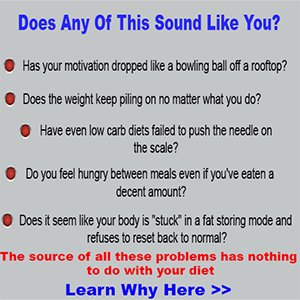Improve Metabolic Risks With Diet, Exercise, Or Both?
The condition known as Metabolic Syndrome is a combination of many different risk factors, which increase your risk of many chronic diseases.
In fact, Metabolic Syndrome could increase your risk for developing Type 2 Diabetes, heart disease, and having a stroke.
The incidence of Metabolic Syndrome in the US is continuing to rise, with most cases potentially attributed to being overweight or obese seen in children, young adults, and adults.
There are many factors associated with the development of Metabolic Syndrome. Some include: age, genetics, change in hormone levels, and lack of exercise.
However, researchers have pinpointed two main factors which could increase your risk for developing Metabolic Syndrome.
First, if you carry your weight in the upper and middle portions of your body (central obesity or having an apple share), then you have a higher risk for developing Metabolic Syndrome.
Secondly, if you suffer from insulin resistance (a condition where your body cannot utilize insulin) this also may increase your risk for Metabolic Syndrome.
Doctors and researchers alike have struggled to determine the most effective way to combat the effects of Metabolic Syndrome.
Now, a new study published in The New England Journal of Medicine, shows a potential link between diet and the combination of diet and exercise and a reduction in risk factors associated with Metabolic Syndrome.
Let me explain…
The Research
According to this study, obesity could increase the age-related decline in physical function and cardiometabolic health.
They have shown that diet and exercise could lead to dramatic improvements in health as opposed to either diet or exercise alone.
However, this study shows the results that diet or the combination of diet and exercise may have on cardiometabolic risk factors in older, obese, individuals.
They performed a randomized, controlled trial, that involved 107 obese, older adults (>65 years of age).
The participants were divided into four categories: control, diet group, exercise group, and a diet and exercise combined group.
Of the 107 adults, 93 of them completed the trial.
The researcher’s main objective was to see changes in insulin sensitivity. They also looked at secondary outcomes such as insulin
response, waist circumference, abdominal obesity, blood pressure (systolic and diastolic), and the serum levels of lipids (fats) and adipocytokines.
From their work, they discovered that glucose and insulin area under the curve improved in the diet and the combination of diet and exercise group.
They also noted that there was a decrease in blood pressure (both systolic and diastolic), waist circumference, abdominal visceral fat, serum triglyceride levels, C-reactive protein, and TNF-R levels, compared to the exercise only and placebo group.
The researchers also showed that diet and the combination group had an increase in Adiponectin levels, compared to the control and exercise only group. They also noted a decrease in body weight in the diet and diet and exercise only groups as well.
They concluded that diet induced weight loss but not exercise training improves insulin sensitivity and multiple other cardiometabolic factors in obese older adults.
They also concluded that weight loss is particularly important in obese older adults to decrease the risk for cardiometabolic syndrome.
Although this research is new, other research needs to be performed in order to verify their findings. However, diet and the combination of diet and exercise could provide new treatment option(s) for reducing the occurrence of Metabolic Syndrome in obese adults.
Diet and Exercise and Your Health
Metabolic Syndrome is on the rise in the US, and could contribute to the rise in chronic diseases such as heart disease, Type 2 Diabetes, and the risk for stroke.
Changing different aspects of your health, including diet and exercise, could reduce your risk for Metabolic Syndrome.
According to the results this study, diet alone and the combination of diet and exercise could result in a reduced risk for cardiometabolic conditions in obese, older adults.
By including exercise and altering your diet, you could improve your health by reducing your risk for developing metabolic syndrome.
Plus, diet and exercise may boost your metabolism, which could improve your weight loss results, therefore potentially reducing other risk factors as well.
NEXT: 8 X Greater Abdominal Fat Loss >>
References:
Bouchonville MF. Abstract S18-1. Presented at: the Endocrine Society’s 94th Annual Meeting & Expo; June 23-26, 2012; Houston.
About Jayson Hunter & Jaylab Pro

Jaylab Pro was founded by Registered Dietitian Jayson Hunter. Jayson has been recognized as one of America's foremost weight loss experts by America's Premier Experts™. He has also been featured in USA Today for this accomplishment. Jayson is also a best-selling author having co-authored multiple books in health & fitness and business growth. Jayson and the Jaylab Pro team are proud to create content that helps improve the lives of millions of people around the world. We hope you enjoy it just as much as others have.
 If you order a JayLabPro SmartShip product or any Combo Package, we will automatically ship you a new supply of the product or products you have ordered every month, starting 30 days after your initial order is shipped, and continuing until you cancel. The credit card you are using today will be billed the lowest available price for those product or products when your order is shipped, but shipping will be FREE. You may log into your customer account or call our customer service department toll-free at 1-888-9GETPRO (1-888-943-8776) between the hours of 8am – 9pm EST Mon-Fri to cancel future shipments, customize the timing of your shipments, or change the credit card used for billing.
If you order a JayLabPro SmartShip product or any Combo Package, we will automatically ship you a new supply of the product or products you have ordered every month, starting 30 days after your initial order is shipped, and continuing until you cancel. The credit card you are using today will be billed the lowest available price for those product or products when your order is shipped, but shipping will be FREE. You may log into your customer account or call our customer service department toll-free at 1-888-9GETPRO (1-888-943-8776) between the hours of 8am – 9pm EST Mon-Fri to cancel future shipments, customize the timing of your shipments, or change the credit card used for billing.










